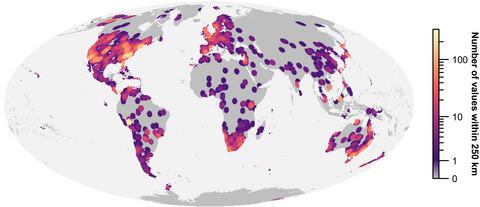当前位置:
X-MOL 学术
›
Funct. Ecol.
›
论文详情
Our official English website, www.x-mol.net, welcomes your
feedback! (Note: you will need to create a separate account there.)
Geographical bias in physiological data limits predictions of global change impacts
Functional Ecology ( IF 4.6 ) Pub Date : 2021-04-19 , DOI: 10.1111/1365-2435.13807 Craig R. White 1, 2 , Dustin J. Marshall 1, 2 , Steven L. Chown 1 , Susana Clusella‐Trullas 3 , Steven J. Portugal 4 , Craig E. Franklin 5 , Frank Seebacher 6
中文翻译:

生理数据中的地理偏差限制了对全球变化影响的预测
更新日期:2021-04-19
Functional Ecology ( IF 4.6 ) Pub Date : 2021-04-19 , DOI: 10.1111/1365-2435.13807 Craig R. White 1, 2 , Dustin J. Marshall 1, 2 , Steven L. Chown 1 , Susana Clusella‐Trullas 3 , Steven J. Portugal 4 , Craig E. Franklin 5 , Frank Seebacher 6
Affiliation

|
- Climate affects all aspects of biology. Physiological traits play a key role in mediating these effects, because they define the fundamental niche of each organism.
- Climate change is likely to shift environmental conditions away from physiological optima. The consequences for species are significant: they must alter their physiology through plasticity or adaptation, move, or decline to extinction. The ability to understand and predict such organismal responses to global change is, however, only as good as the geographical coverage of the data on which these predictions are based.
- Geographical biases in the state of physiological knowledge have been identified, but it has not been determined if these geographical biases are likely to limit our capacity to predict the outcomes of global change. We show that current knowledge of physiological traits is representative of only a limited range of the climates in which terrestrial animals will be required to operate, because data for animals from only a limited range of global climates have been incorporated in existing compilations.
- We conclude that geographical bias in existing datasets limits our capacity to predict organismal responses in the vast areas of the planet that are unstudied, and that this geographical bias is a much greater source of uncertainty than the difference between the current climate and the projected future climate. Addressing this bias is urgent to understand where impacts will be most profound, and where the need for intervention is most pressing.
中文翻译:

生理数据中的地理偏差限制了对全球变化影响的预测
- 气候影响生物学的方方面面。生理特征在调节这些影响方面起着关键作用,因为它们定义了每个生物体的基本生态位。
- 气候变化很可能使环境条件偏离生理最佳状态。对物种的影响是重大的:它们必须通过可塑性或适应、迁移或走向灭绝来改变它们的生理机能。然而,理解和预测这种对全球变化的有机体反应的能力取决于这些预测所依据的数据的地理覆盖范围。
- 生理知识状态中的地理偏差已经确定,但尚未确定这些地理偏差是否可能限制我们预测全球变化结果的能力。我们表明,目前对生理特征的了解仅代表了需要陆生动物活动的有限范围的气候,因为仅来自有限范围的全球气候的动物数据已纳入现有汇编。
- 我们得出结论,现有数据集中的地理偏差限制了我们预测地球上未经研究的广大地区的生物反应的能力,并且这种地理偏差比当前气候和预计的未来气候之间的差异是更大的不确定性来源. 解决这种偏见迫切需要了解影响最深远的地方,以及最迫切需要干预的地方。











































 京公网安备 11010802027423号
京公网安备 11010802027423号